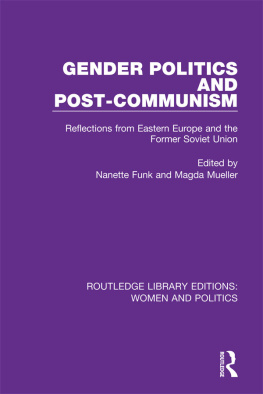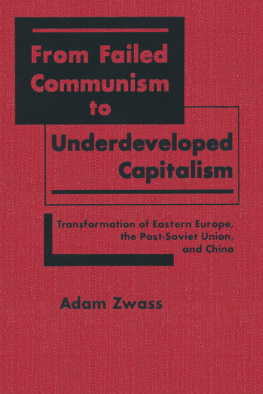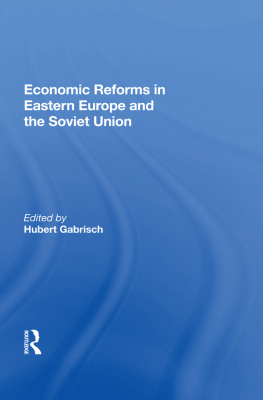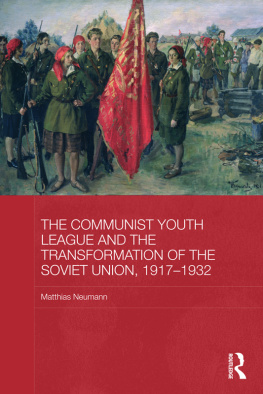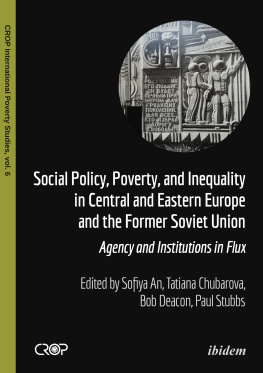Youth and Social Change in Eastern Europe and the Former Soviet Union
Two decades have now passed since the revolutions of 1989 swept through Eastern Europe and precipitated the collapse of state socialism across the region, engendering a period of massive social, economic and political transformation. This book explores the ways in which young people growing up in post-socialist Eastern Europe and the former Soviet Union negotiate a range of identities and transitions in their personal lives against a backdrop of transformation in their societies.
Drawing upon original empirical research in a range of countries, the contributors explore the various freedoms and insecurities that have accompanied neo-liberal transformation in post-socialist countries in spheres as diverse as consumption, migration, political participation, volunteering, employment and family formation and examine the ways in which they have begun to re-shape different aspects of young peoples lives. In addition, while social change is a central theme of the book, all of the chapters in this collection indicate that the new opportunities and risks faced by young people continue both to underpin and to be shaped by familiar social and spatial divisions, not only within and between the countries addressed, but also between East and West.
This book was originally published as a special issue of the Journal of Youth Studies.
Charles Walker is Lecturer in Sociology at the University of Southampton, UK, and Honorary Research Associate at the School of Slavonic and East European Studies, University College London, UK.
Svetlana Stephenson is Reader in Sociology at London Metropolitan University, UK.
Youth and Social Change in Eastern Europe and the Former Soviet Union
Edited by
Charles Walker and Svetlana Stephenson
First published 2012
by Routledge
2 Park Square, Milton Park, Abingdon, Oxon, OX14 4RN
Simultaneously published in the USA and Canada
by Routledge
711 Third Avenue, New York, NY 10017
Routledge is an imprint of the Taylor & Francis Group, an informa business
2012 Taylor & Francis
This book is a reproduction of the Journal of Youth Studies, volume 13, issue 5. It also contains one article from the Journal of Youth Studies, volume 12, issue 5. The Publisher requests to those authors who may be citing this book to state, also, the bibliographical details of the special issue on which the book was based.
All rights reserved. No part of this book may be reprinted or reproduced or utilised in any form or by any electronic, mechanical, or other means, now known or hereafter invented, including photocopying and recording, or in any information storage or retrieval system, without permission in writing from the publishers.
Trademark notice: Product or corporate names may be trademarks or registered trademarks, and are used only for identification and explanation without intent to infringe.
British Library Cataloguing in Publication Data
A catalogue record for this book is available from the British Library
ISBN13: 978-0-415-50371-6
Publishers Note
The publisher would like to make readers aware that the chapters in this book may be referred to as articles as they are identical to the articles published in the special issue. The publisher accepts responsibility for any inconsistencies that may have arisen in the course of preparing this volume for print.
Contents
Charles Walker and Svetlana Stephenson
Michaela Pykov and Steven Miles
Rosie Read
Anne White
Charles Walker
Pamela Abbott, Claire Wallace, Marianna Mascauteanu and Roger Sapsford
Antonina Tereshchenko
Donnacha Beachin and Abel Polese
Charles Walker and Svetlana Stephenson
Two decades have now passed since the revolutions of 1989 swept through Eastern Europe and precipitated the collapse of state socialism across the region, engendering a period of massive social, economic and political transformation. Despite the end-of-history rhetoric surrounding the subsequent transitions from state socialism to democracy and neo-liberal capitalism, all of the countries in the region from those which have experienced a spiral of economic decline and political uncertainty to those which have now acceded to the European Union remain in a state of transformation. In this collection, we wish to explore the ways in which young people growing up in post-socialist Eastern Europe and the former Soviet Union negotiate a range of identities and transitions in their personal lives against a backdrop of thoroughgoing transformation in their societies. A number of the chapters contained in the collection, and the idea for the collection itself, stem from a conference held at St. Antonys College, the University of Oxford, in March 2009, which drew together emerging and established scholars from a wide variety of disciplinary backgrounds and with a diverse range of country specialisms1. Although the geographical and thematic scope of the conference cannot be replicated here, we feel that the group of countries and topics addressed in the collection nevertheless reflects many of the key developments and divergences emerging across the region, as well as the range of freedoms and insecurities that have accompanied neo-liberal transformation and begun to re-shape different aspects of young peoples lives. In addition, while social change is a central theme of the collection, all of the chapters contained here indicate that the new opportunities and risks faced by young people in spheres as diverse as consumption, migration, political participation, volunteering, employment and family formation continue both to underpin and to be shaped by familiar social and spatial divisions, not only within and between the countries addressed, but also between East and West. This introduction begins by outlining the ways in which changes taking place in the lives of young people in Eastern Europe and the former Soviet Union have been theorised to date, and proceeds to outline the key themes explored by the individual contributions.
Beyond problematising youth
In recent years, studies of young people in Western societies have explored issues relating to social change and social inequality through theories of reflexive modernisation, pointing variously to processes of individualisation and risk, the erosion of social identities and the destandardisation of biographies and the life course (Beck and Beck-Gernsheim 2002). While such theories, and their empirical applications, have tended to focus on the Western world (Beck 1992, p. 92), the notions of individualisation and reflexivity nevertheless appear to be rooted in a particular type of modernity characterised by the globalisation of cultural and economic flows and the dominance of market-based forms of social organisation which reaches beyond the edges of Western Europe. Indeed, given the neo-liberal character of economic and political transition in Eastern Europe and, perhaps more importantly, the fundamentally state-led nature of the variant of modernity it has attempted to leave behind, these notions may be particularly relevant in interpreting changes taking place in the lives of young people growing up in the post-socialist East. Under socialism, practically every aspect of young peoples lives had been structured by some form of state organisation or agency, from their moral upbringing by the Communist Youth Organisation (Komsomol) to the assignment of mandatory work placements through the distribution system. As such, if in Western Europe youth as a social category emerged from the general process of modernisation, youth under socialism was a product of what Bauman (2001, p. 62) calls modernity streamlined, as the rationalities of state planning and the ideological significance of youth as the constructors of communism (Pilkington 1994) combined to place young people in a state of permanent mobilisation (Wallace 2003, p. 5). By contrast, the post-socialist period has seen a near-total withdrawal of the forms of authoritarian paternalism that had characterised the socialisation and integration of youth under socialism and at the same time, a reintegration into the global economic and cultural flows from which socialist youth had for decades been protected. In this context, the chronic stability, predictability and manufactured limitations which characterised young peoples transitions and cultural lives under socialism appeared to give way in the early 1990s to a tide of individual choice and responsibility, such that both the pace and depth of processes of individualisation would seem to have been extreme.




